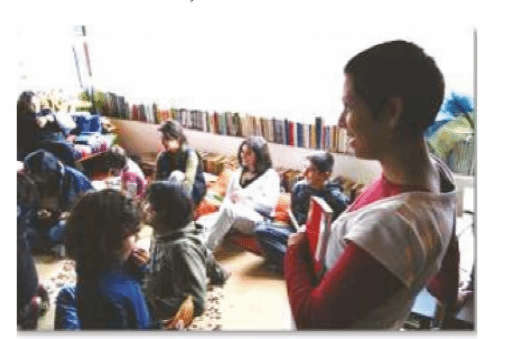|
Keywords: sustainable development// shared values// indicators// assessment tools// civil society organisations// education for sustainable development (ESD)// evaluation tool // values-based indicators// |
Funded by: EU FP7-ENV BSG-CSO Cost: 1,023,075€ (EC Contribution: 814,565.00€) |
Start Date: 20th January 2009 Duration: 24-27 months |
Key team members: MKH (Project Co-ordinator), DP, IV, GP, GB, JC, |
Partners: Charles University in Prague; Earth Charter Initiative; EBBF; ARC; People’s Theater |
Key Contributions to WeValue Knowledge System: |
This was the conception project for all subsequent WeValue work. It was initiated as a co-design, action-research project with and for Civil Society partners in several countries, who deeply shaped the original objectives and research from start to finish. |
It began assuming that project/group level indicators could be precisely defined, and by learning from the CSO partners quickly discovered that no framework could encompass or communicate what they wanted to express. Instead, grounded, self-formed indicators were allowed to emerge, and the process to facilitate that became the main focus of the work. (Years later, they were found to be linkable to universal concepts via fuzzy interfacing.) |
Relevant papers published: From the Publications List, #1 gives an overview of the project at its inception. #2, #4, #9, #12 are articulations of early findings, albeit packaged for the journals that accepted them, and linked to conversations in them. The ESDinds project reports on the official website are rich in informal content. |
Paper #5 articulates a fundamental concept arising from this project: Bringing the "missing pillar" into sustainable development goals: towards intersubjective values-based indicators. It is highly cited. |
Official websites: https://cordis.europa.eu/project/id/212237 |
|
Official purpose: |
This project involves five very different Civil Society Organisations (CSOs) involved in Education for Sustainable Development in a very wide range of project types coming together to investigate two main aims, with academic assistance: 1) to develop more useful indicators to measure the impact of value/behaviour change elements in their ESD projects – at the project level. This will enable them to better prioritise their resources across a wide range of project types. A considerable range of value-based projects will be considered, involving SMEs, communities and schoolchildren. The newly developed project level impact indicators will be related to those for other levels, e.g. regional, national; and those used in academic arenas. It will be necessary to particularly focus on the development of less established SD indicators such as " well-being" which are can be strongly affected by spiritual/faith-based values and activities (Clark and Lelkes, 2005). Indicators for this have been difficult to quantify so far in mainstream discussions, but by focussing at project impact level we believe some can be defined and refined, with CSOs working with academics. Some schools of thought suggest that reinforcing local values will lead more effectively to behaviour changes, leading to larger SD impacts; without ways to measure, such ideas cannot be tested. 2) to improve the environmental impact of projects through advice at ground level. Three of the CSO participants in this proposal are faith-based whose projects generally focus on social issues more than environmental ones. The RTDs will be asked to outline possibilities to increase the projects’ environmental impact within their current context, leading to suggestions and guidelines for such CSOs to allow them to be more effective at environmental impact even when this is not their main focus. Researchers officers will work extensively in the field on CSO projects, with CSO staff, for both aims. |
Project findings and impact |
All of the work on this entire website is part of the impact of this conception project, ESDinds. Including the other projects (c15), papers (c30+), grants (c4), types of applications demonstrated (c8), contributions to other disciplines (c10). |
The first phase of research generated a draft set of 171 proto-indicators (i.e. localisable prototypes, or templates, for generating measurable indicators). These were later reduced to 125, through iterative field testing. |
The relevance and usefulness of the indicators in a wide variety of contexts has far exceeded initial expectations. The interim web platform received over 11,000 hits from 138 countries, and registered 162 members from the non-profit, humanitarian sector, private sector, and academic institutions. |
The ESDinds project has had a far-reaching impact on theory and practice in a range of different fields. In many organisations where the proto-indicators have been tested in real evaluation contexts, they have catalysed a significant shift in values, vision and strategy. |
Formal documents and publications |
The formal EU project reports at various stages of the project, and including the Final Report, can be found at: https://cordis.europa.eu/project/id/212237/reporting |
Further information |
Project achievements and impact |
In 2011 the immediate Project Impact was listed as: |
A set of values-based indicators with broad practical utility |
Partners |
Charles University Environment Center (CUEC), Prague, Czech Republic: Dr Tomas Hak, Dr Svatava Janouskova and Dr Martin Zahradnik |
Alliance of Religions and Conservation: John Smith and Martin Palmer |
Earth Charter Initiative: Alicia Jimenez |
European Baha’i Business Forum: Daniel Truran |
People’s Theater, Germany: Curtis Volk |




